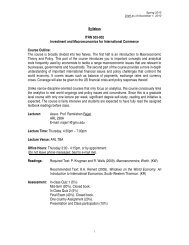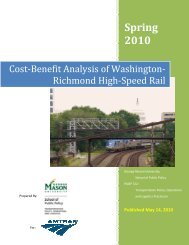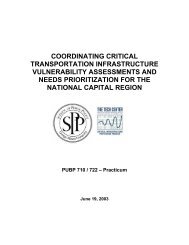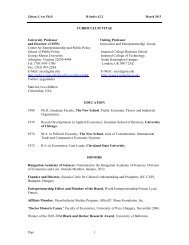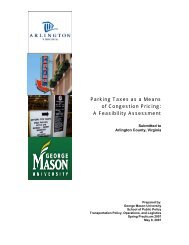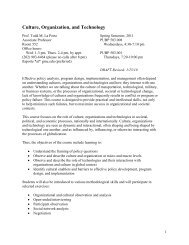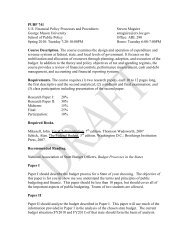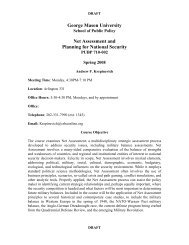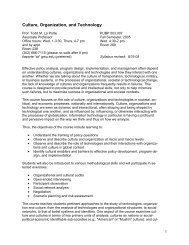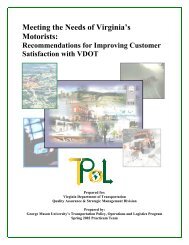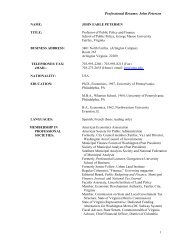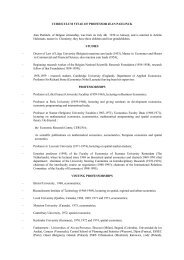ITRN 504-002 - George Mason University
ITRN 504-002 - George Mason University
ITRN 504-002 - George Mason University
Create successful ePaper yourself
Turn your PDF publications into a flip-book with our unique Google optimized e-Paper software.
<strong>ITRN</strong> <strong>504</strong><br />
Microeconomics and Trade for International Commerce<br />
Draft Revised: 26 January 2011<br />
Kenneth A. Reinert<br />
Phone: 703-993-8212<br />
Email: kreinert@gmu.edu<br />
Office: Founders Hall, Room 627<br />
Office hours: Tuesdays 6-7PM<br />
Home page: http://mason.gmu.edu/~kreinert<br />
Study Guide<br />
Glossary (pdf file)<br />
Course Description<br />
This course provides an introduction to microeconomics and international trade for the ICP<br />
student. In the first part of the course, our main objective is to understand the basic principles<br />
of the market system underlying local, national, and international economies. Here we will<br />
assess both the desirable properties and the limitations of the market system, as well as the<br />
potential roles of government. In the second part of the course, our main objective is to<br />
understand the forces behind international trade. Here we will assess the main causes of<br />
international trade, their effects, the analysis of trade policies, and the institutions of<br />
international trade.<br />
Learning Outcomes<br />
Knowledge and Understanding<br />
Students will understand the basic concepts and terms of microeconomics as they apply<br />
to policy analysis.<br />
Students will understand the causes of international trade and the political economy of<br />
trade.<br />
Analytical Skills and Abilities<br />
Students will be able to use the supply and demand model for policy analysis, including<br />
trade policy analysis, and to calculate elasticities.<br />
Professional Development<br />
Students will be conversant with the basic terms of economic trade policy analysis as<br />
used in the profession.
Required Books<br />
There will be no books placed in the bookstore.<br />
Krugman, P. and R. Wells, Microeconomics, Worth, 2009.<br />
To be accessed via Aplia (see below).<br />
Reinert, K.A.,<br />
Windows on the World Economy: An Introduction to International Economics,<br />
Cambridge <strong>University</strong> Press, 2012.<br />
Aplia<br />
Your access to the Krugman and Wells textbook, along with problem sets, will be via Aplia.<br />
The Aplia site requires a separate registration process. Here are the steps:<br />
1. Connect to http://econ.aplia.com.<br />
2. If you already have an account, sign in. Go to My Courses page, and then click the<br />
Enroll in a New Course button. If you don't have an account, click the Create<br />
a New Account button, and choose Student Account.<br />
3. Enter your course key when prompted: 37VG-UEUU-A796 . Continue to follow the<br />
on-screen instructions to access your course.<br />
Course Requirements and Grading<br />
Midterm exam- 30 percent<br />
Final exam- 30 percent<br />
Problem Sets- 25 percent<br />
Class participation- 15 percent<br />
Course Outline and Readings<br />
Week 1 (25 January): Introduction to Class<br />
Reinert, Chapter 1, "Windows on the World Economy."<br />
The Economist, "The Oceans: A Sea of Troubles," 3 January 2009.<br />
Link to PowerPoint Presentation.<br />
Aplia graded problem set:<br />
"Introduction to Using Aplia Problem Sets," deadline- 30 January, 11:45 PM<br />
Week 2 (1 February): Tools of Analysis<br />
Krugman and Wells, Chapter 1, "First Principles."
Krugman and Wells, Chapter 2, "Economic Models: Tradeoffs and Trade,"<br />
including Appendix.<br />
The Economist, "Business and Water: Running Dry," August 21, 2008.<br />
Aplia graded problem sets:<br />
"Chapter 1- First Principles," deadline- 6 February, 11:45 PM<br />
"Chapter 2- Economic Models," deadline- 6 February, 11:45 PM<br />
Week 3 (8 February): The Supply and Demand Model<br />
Krugman and Wells, Chapter 3, "Supply and Demand."<br />
Krugman and Wells, Chapter 5, "The Market Strikes Back."<br />
The Economist, "Excellence in a Cup," 27 January 2007.<br />
Aplia graded problem sets:<br />
"Chapter 3- Supply and Demand," deadline- 13 February, 11:45 PM<br />
"Chapter 5- The Market Strikes Back," deadline- 13 February, 11:45 PM<br />
Recommended: Lindblom, Chapter 3, "Market-System Coordination."<br />
Week 4 (15 February): Elasticities<br />
Krugman and Wells, Chapter 6, "Elasticity."<br />
The Economist, "Pricing Strategies: The Price is Wrong," 23 May 2<strong>002</strong>.<br />
Elasticity table<br />
Aplia graded problem set:<br />
"Chapter 6- Elasticity," deadline- 20 February, 11:45 PM<br />
Week 5 (22 February): Allocative Efficiency and Taxes<br />
Krugman and Wells, Chapter 4, "Consumer and Producer Surplus."<br />
Krugman and Wells, Chapter 7, "Taxes."<br />
The Economist, "Petrol Tax," 23 September 2010.
Recommended: Lindblom, Chapter 12, "Too Little, Too Late."<br />
Aplia graded problem set:<br />
"Chapter 4- Consumer and Producer Surplus," deadline- 27 February, 11:45 PM<br />
"Chapter 7- Taxes," deadline- 27 February, 11:45 PM<br />
Week 6 (1 March): The Theory of the Firm<br />
Krugman and Wells, Chapter 9, "Making Decisions."<br />
Krugman and Wells, Chapter 12, "Behind the Supply Curve."<br />
Class handout on the firm.<br />
Aplia graded problem sets:<br />
"Chapter 9- Making Decisions," deadline- 6 March, 11:45 PM<br />
"Chapter 12- Behind the Supply Curve," deadline- 6 March, 11:45 PM<br />
Week 7 (8 March): The Theory of the Firm Continued<br />
Krugman and Wells, Chapter 13, "Perfect Competition and the Supply Curve."<br />
Aplia graded problem sets:<br />
"Chapter 13- Perfect Competition and the Supply Curve," deadline- 13 March, 11:45 PM<br />
Week 8 (15 March): Spring Break<br />
Week 9 (22 March): Midterm Examination<br />
See study guide link at top of page.<br />
Week 10 (29 March): Market Failure (Monopoly, Externalities, Public Goods)<br />
Krugman and Wells, Chapter 14, "Monopoly."<br />
Krugman and Wells, Chapter 17, "Externalities."<br />
Krugman and Wells, Chapter 18, "Public Goods and Common Resources."<br />
Kaul, Grunberg, and Stern, "Defining Global Public Goods," in Global Public<br />
Goods, Oxford <strong>University</strong> Press, Oxford, 1999, 2-19. On electronic reserve.
Recommended: Lindblom, Chapter 5, "Enterprise and Corporation."<br />
Aplia graded problem sets:<br />
"Chapter 14- Monopoly," deadline- 3 April, 11:45 PM<br />
"Chapter 17- Externalities," deadline- 3 April, 11:45 PM<br />
"Chapter 18- Public Goods," deadline- 3 April, 11:45 PM<br />
Week 11 (5 April): International Trade<br />
Reinert, Chapter 2, "Absolute Advantage."<br />
Reinert, Chapter 3, "Comparative Advantage."<br />
Reinert, Chapter 4, "Intra-Industry Trade."<br />
Week 12 (12 April): Political Economy of Trade and Trade Policy<br />
Reinert, Chapter 5, "The Politics of Trade."<br />
Reinert, Chapter 6, "Trade Policy Analysis."<br />
Recommended: K.A. Reinert and J.F. Francois, "Partial Equilibrium Modeling,"<br />
Princeton Encycopedia of the World Economy, 2009.<br />
Week 13 (19 April): No Class<br />
Week 14 (26 April): The WTO and Preferential Trade Agreements<br />
Reinert, Chapter 7, "The World Trade Organization."<br />
Reinert, Chapter 8, "Regional Trade Agreements."<br />
The Economist, "Regional Trade Agreements: A Second-Best Choice,"<br />
4 September 2008.<br />
The Doha Ministerial Declaration.<br />
Week 15 (3 May): International Production<br />
Reinert, Chapter 9, "Foreign Market Entry and International Production."<br />
Reinert, Chapter 10, "Foreign Direct Investment and Intra-Firm Trade."
Reinert, Chapter 11, "Managing International Production."<br />
Week 16 (10 May): Review of Semester<br />
Week 17 (17 May): Cumulative Final Exam<br />
See study guide link at top of page.<br />
Other Useful Books<br />
Goldin, I. and K.A. Reinert, Globalization for Development, World Bank,<br />
2007.<br />
Hill, C.W.L., International Business, McGraw-Hill, 2007.<br />
Hoekman, B.M. and M.M. Kostecki, The Political Economy of the World Trading<br />
System, Oxford <strong>University</strong> Press, Oxford, 2009.<br />
Kurlansky, M., Cod, Penguin, 1998. A scarce (common pool) resource in<br />
historical perspective.<br />
Levinson, M., The Box, Princeton <strong>University</strong> Press, 2006. A history of<br />
container shipping and its impacts on the world trading system.<br />
Lindblom, C.E., The Market System, Yale <strong>University</strong> Press, 2001.<br />
Walter, A. and G. Sen, Analyzing the Global Political Economy, Princeton<br />
<strong>University</strong> Press, 2009.<br />
Some Policies<br />
Exams are not "open book" or "open notes."<br />
There is no "extra work" that can be done for "extra credit."<br />
Students are responsible for obtaining notes from other class members if they miss a class.<br />
The GMU honor code will be enforced. To be more specific: If I can show that a student<br />
cheated on an exam, that student will fail the course.<br />
It is my personal policy not to discriminate among students based on race, ethnicity,<br />
religious faith, national origin, gender, sexual orientation, or physical ability (see below).<br />
Academic Accommodation for a Disability
If you are a student with a disability and you need academic accommodations, please see<br />
me and contact the Disability Resource Center (DRC) at 703-993-2474. All academic<br />
accommodations must be arranged through the DRC.



